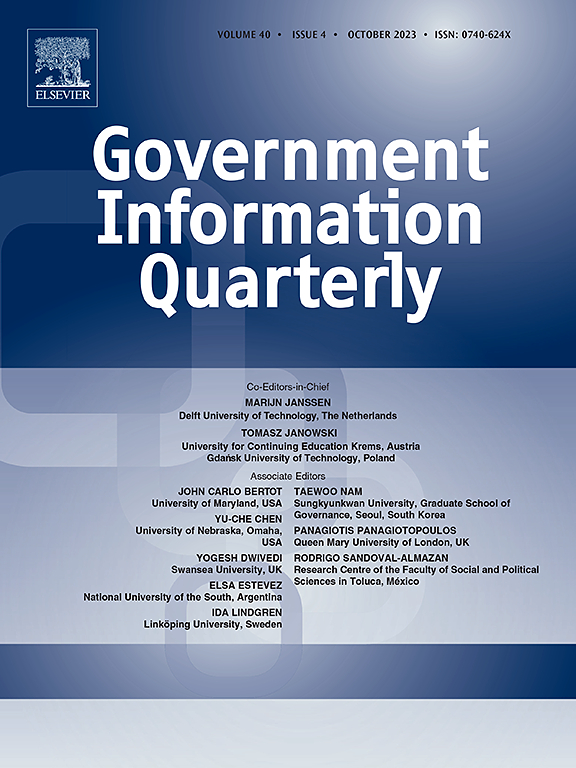数字公民参与的人工智能:集体智能架构的设计原则
IF 7.8
1区 管理学
Q1 INFORMATION SCIENCE & LIBRARY SCIENCE
引用次数: 0
摘要
数字公民参与带来的挑战和数字参与平台(dpp)产生的大量数据为实施人工智能(AI)解决方案创造了理想的环境。然而,目前dpp中的人工智能解决方案主要集中在技术挑战上,往往忽视了它们的社会影响,没有充分利用人工智能的潜力来赋予公民权力。因此,本文的目标是研究如何设计集成技术人工智能解决方案的数字参与平台,同时考虑到它们实施的社会背景。使用集体智能作为核心理论,通过文献综述和焦点小组,我们为开发具有社会技术意识的人工智能架构生成了设计原则。然后由人工智能领域的专家和公民参与来验证这些原则。这些原则建议优化人工智能解决方案与项目目标的一致性,确保其跨多个级别的结构化集成,提高透明度,监控人工智能驱动的影响,动态分配人工智能行动,赋予用户权力,并平衡认知差异。这些原则为未来人工智能驱动的人工制品和数字公民参与理论提供了理论基础。本文章由计算机程序翻译,如有差异,请以英文原文为准。
Artificial intelligence for digital citizen participation: Design principles for a collective intelligence architecture
The challenges posed by digital citizen participation and the amount of data generated by Digital Participation Platforms (DPPs) create an ideal context for the implementation of Artificial Intelligence (AI) solutions. However, current AI solutions in DPPs focus mainly on technical challenges, often neglecting their social impact and not fully exploiting AI's potential to empower citizens. The goal of this paper is thus to investigate how to design digital participation platforms that integrate technical AI solutions while considering the social context in which they are implemented. Using Collective Intelligence as kernel theory, and through a literature review and a focus group, we generate design principles for the development of a socio-technically aware AI architecture. These principles are then validated by experts from the field of AI and citizen participation. The principles suggest optimizing the alignment of AI solutions with project goals, ensuring their structured integration across multiple levels, enhancing transparency, monitoring AI-driven impacts, dynamically allocating AI actions, empowering users, and balancing cognitive disparities. These principles provide a theoretical basis for future AI-driven artifacts, and theories in digital citizen participation.
求助全文
通过发布文献求助,成功后即可免费获取论文全文。
去求助
来源期刊

Government Information Quarterly
INFORMATION SCIENCE & LIBRARY SCIENCE-
CiteScore
15.70
自引率
16.70%
发文量
106
期刊介绍:
Government Information Quarterly (GIQ) delves into the convergence of policy, information technology, government, and the public. It explores the impact of policies on government information flows, the role of technology in innovative government services, and the dynamic between citizens and governing bodies in the digital age. GIQ serves as a premier journal, disseminating high-quality research and insights that bridge the realms of policy, information technology, government, and public engagement.
 求助内容:
求助内容: 应助结果提醒方式:
应助结果提醒方式:


